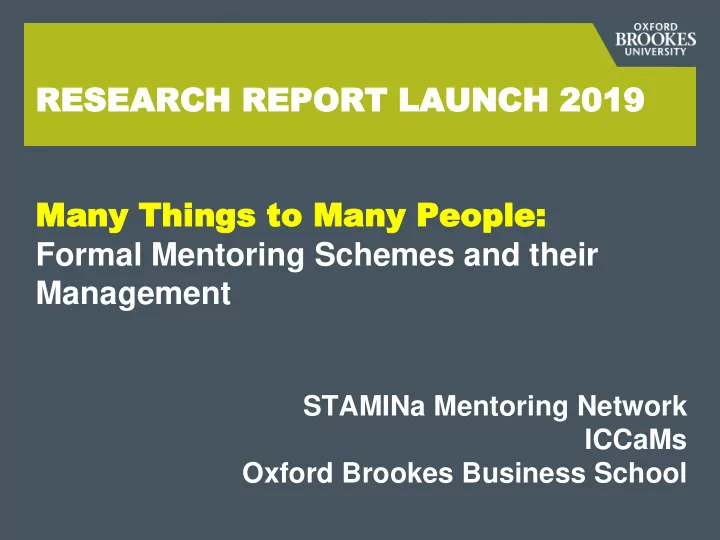

RESE RESEARCH ARCH REPORT REPORT LAUNCH LAUNCH 2019 2019 Many Many Things Things to Many to Many People: People: Formal Mentoring Schemes and their Management STAMINa Mentoring Network ICCaMs Oxford Brookes Business School
WELCO WELCOME ME Giles Orr Head of CPD, Consultancy & Training Oxford Brookes Business School
Brookes Brookes Wifi Wifi Pas Passw sword ord HelloB HelloBrookes rookes @MentorNetwork1 @ICCAMS @brookesBS #ManyThings2ManyPeople #FormalMentoringSchemes
Today’s schedule o PRESENTATION OF THE MAP AND REPORT – Part 1 Purpose – led by Drs Judie Gannon and Rhianon Washington BREAK o PRESENTATION OF THE REPORT – Parts 2 and 3 Practicalities and People – led by Drs Judie Gannon and Rhianon Washington LUNCH o PROGRAMME OF SUPPORT AND RESOURCES FOR MSCs – led by Dr Carmelina Lawton-Smith o PLENARY – led by Dr Judie Gannon CLOSE
Background to the Study ▪ History of Mentoring research – the ‘shift’ ▪ Limited empirical research ▪ Following in the footsteps of Abbott and colleagues (2010) ▪ Methodology ▪ Sample, SurveyMonkey and Interviews ▪ Results – Purpose, Practicalities and People ▪ FLINGA – https://flinga.fi What’s your priority? Access code FXFU69T Join link https://flinga.fi/s/FXFU69T
Part 1 Purpose & Map ▪ Purpose of schemes ▪ Sustainability - durability ▪ Origins and development ▪ Funding ▪ Context ▪ Size and scale ▪ Nature of mentors and mentees
Part 1 Purpose & Map Figure 1.1 The Purpose of Formal Mentoring schemes 60 50 40 30 20 10 0
Part 1 Purpose & Map
Part 1 Purpose & Map: Size and Scale Figure 1.7 Currently how many mentoring pairs are working together on your scheme 35% 30% 25% 20% 15% 10% 5% 0% a. None b. Less than 20 c. 21 - 50 d. 51 - 100 e. 101 - 500 f. Over 500
Part 1 Purpose & Map
Part 1 Purpose & Map ▪ How might the map be used by practitioners? ▪ How do we support the funding challenges formal mentoring schemes face?
Part 2 Practicalities & People ▪ Nature of formal mentoring ▪ Forms of Mentoring ▪ Frequency and Types of interactions ▪ Features of Mentoring schemes ▪ Recruitment ▪ Matching ▪ Administration ▪ Monitoring and Support ▪ Training ▪ Evaluation ▪ Influencers and Governance
Part 2 Practicalities: Forms of Mentoring Figure 2.1 The Forms of Mentoring Adopted 70% 60% 50% 40% 30% 20% 10% 0% a. One to one dyadic b. Group mentoring c. E-mentoring (at a d. Reverse mentoring e. Peer mentoring f. Speed mentoring (a mentoring (between an (where multiple mentors distance through (where a junior colleague (between individuals in series of short, focused experienced mentor and and mentees can interact technology) mentors a senior equivalent positions or interactions with multiple a less experienced in a group setting) colleague) with similar experiences) partners) mentee)
Part 2 Practicalities: Forms of Mentoring Figure 2.4 Formats for offering Mentoring guidance and training 70% 60% 50% 40% 30% 20% 10% 0% Mentors receive Mentors receive Mentees receive Mentees receive Mentees and Mentors Mentors participate in Mentees participate in briefing notes/session training briefing notes/session training are trained together learning, networking learning, networking or conferencing or conferencing events events Face 2 Face Online Not offered
Part 2 Practicalities: The Big 6 ▪ FLINGA Access code FHFXHTT Join link https://flinga.fi/s/FHFXHTT TOP THREE? ▪ Recruitment ▪ Matching ▪ Administration ▪ Monitoring and Support ▪ Training ▪ Evaluation
Part 3 People ▪ Mentoring Scheme Coordinators ▪ Who are they? ▪ What they do ▪ Skills needed ▪ Challenges
Part 3 People
Part 3 People Figure 3.4 Experience of the Role of Mentoring Scheme Coordinator 90% 80% 70% 60% 50% 40% 30% 20% 10% 0% I had realistic expectations I had relevant previous Role is more challenging Enjoy the diversity of the Skills are used effectively The role is isolating experience than anticipated role in the role Agree Neither agree not disagree Disagree
Part 3 People Table 3.1 Top Three Main Skills areas for Mentoring Scheme Coordinators Skills area 1 Skills area 2 Skills area 3 Organisational skills Time management Flexibility Communication People/social skills Relationship skills management skills Mentoring and Empathy Matching skills and coaching knowledge knowledge and skills Leadership Listening skills Networking skills
Podcast Launch and Lunch! ▪ Isolated but fulfilling – how can we address this as Mentoring scheme coordinators? ▪ How can STAMINa Mentoring Network best support Mentoring scheme coordinators! ▪ The Doctors of Mentoring podcasts – what topics should we cover?
SUPPORTING SUPPORTING MENTORING MENTORING SCHEME SCHEME CO CO-ORDINATO ORDINATORS RS Dr. Carmelina Lawton Smith Associate Lecturer
How can we support you?
Option 1 – On-line resources ▪ On-line modules of 90-120 mins ▪ Including: ▪ Presentation ▪ Reading ▪ Tools ▪ Best Practice ▪ Forum ▪ Quarterly Drop-in ▪ Scheduled ▪ Submit questions ▪ Topic led ▪ Action Learning ▪ Sharing space
Option 2 - Conference ▪ 1.5 day Conference ▪ Day 1 – Half day workshop/training (1-5) ▪ Day 2 - Conference (9.30-4?) ▪ Content? ▪ Scheme Stories ▪ Challenges ▪ Sharing Best Practice ▪ Building a community of practice
Discussion ▪ What do you think of the 2 options? ▪ What might be the barriers to engagement? ▪ What improvements would you make?
What topics would you like more information about? What issues cause you most grief?
Plenary o Report Key conclusions o Evidence base for Formal Mentoring Schemes o Workshop Contributions o Next steps?
Plenary • Podcasts • Case studies • Support Network and Training for Mentoring Scheme coordinators • Build the research base - biennial survey • Sharing and connecting with us and rest of the community of mentoring scheme coordinators
Recommend
More recommend